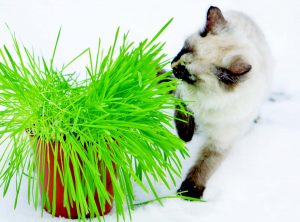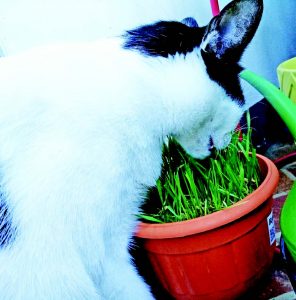Look online and you’ll see many websites and Facebook groups touting the benefits of wheat grass for cats. Wheat grass is cheap, plus their alleged benefits range from providing antioxidants to fixing hairball problems—but how true are these claims?
More importantly, is wheat grass even safe for your feline friend? Let’s look at what current literature has to say.
Diet Preferences
Unlike humans, cats need meat to thrive. According to a 2014 article by Buff and colleagues, feral cats are carnivorous and prefer to eat “…small mammals, birds, fish, reptiles, and invertebrates.” Interestingly, domestic cats share the same instinctive preference as feral cats in terms of nutrients, reported Hewson-Hughes and team in a 2011 study.
However, cats do have a tendency to graze, according to the Society for the Prevention of Cruelty to Animals (SPCA) of Texas: outdoor cats eat grass, while indoor ones make do with potted plants.
While experts don’t agree on why felines snack on greens, there have been theories about how grass-eating helps a cat vomit hairballs. This may seem true for some cats, but not all of them regurgitate after eating grass. This has led some to hypothesize that cats actually like grass, almost the same way we like cake.
Safety First
The American Society for the Prevention of Cruelty to Animals (ASPCA) has an extensive list of toxic and non-toxic plants. If you have any at home, you might want to find out if they’re safe for your cats, in case they decide to do some snacking. (Editor’s note: Or you can turn to page 72 for a list of cat-friendly plants!)
There are ways to deter cats from munching on toxic plants or otherwise non-toxic houseplants that you hope remain untouched, such as spraying them with vinegar. Providing grass free from dangerous chemicals, such as wheat grass you grow from seeds, is also an alternative. The SPCA of Texas deems potted grass a “welcome treat” for many indoor cats.
Word on Wheat
However, few studies support the health claims of feeding wheat grass to cats. A 2004 study by Fekete and colleagues revealed improved gut health for cats that were fed sugar beet pulp fiber rather than other fiber sources. This calls for further research into the benefits of certain fiber sources. (Obviously, however, this doesn’t directly indicate that wheat grass carries the same benefits as beet pulp.)
Overall, the study showed promising results for fiber in feline diets. A more recent study by Fischer and team published in the Journal of Animal Science in 2012 showed that fiber can help overweight cats lose weight by reducing energy digestibility. It can also improve overall gut health by reducing dry matter volume in feces.
Not all fibers are created equal. The more digestible the fiber, the better the fermentation which, according to the above studies, leads to more benefits. However, these are specific to certain fiber sources. Studies are needed to prove that wheat grass fiber also carries the same benefits.
Underlying Problem
While snacking on wheat grass may help a cat with its hairball issues, it doesn’t address the underlying problem that caused the hairball to begin with.
Cats don’t normally develop hairballs if they eat healthy diets, according to ConsciousCat.net. Hairballs occur if a cat’s gut has motility issues, which allegedly develop from diets high in grains. Grain-based food sources disturb the normal flora in the cat’s intestines, possibly leading to inflammation, motility problems, and hairball development.
Many hairball diets boast of high fiber content, which could help cats pass hairballs out of their system. However, not all cats respond to fiber in the same way. Remember how different fiber sources have different effects on gut health?
If your cat has hairball problems, it’s best to seek the advice of your vet, especially if your cat vomits after eating fiber-rich food such as wheat grass. Instead of fiber-rich food, a grain-free diet might do your cat a lot of good.
To Feed or Not to Feed Wheat Grass
So, should you give your cats the wheat grass they’ve been craving? It depends, of course!
If you’re looking for evidence on the benefits of wheat grass, you’ll be disappointed. But if you just want to provide a safe snack for your cat even without proven health benefits, wheat grass may meet your criteria.
Just make sure to take note of your cats’ individual reactions. Vomiting isn’t a good sign as it leads to more problems. Good for you if your cats enjoy the grass without regurgitating a nasty hairball! Even if they don’t get much from what they’re eating, at least they’re having fun.
This appeared in Animal Scene magazine’s April 2018 issue.






